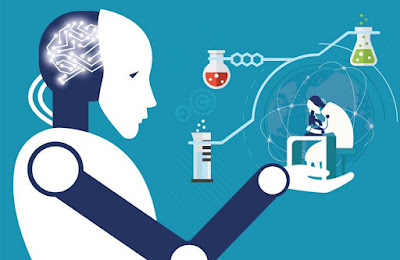Artificial
intelligence aids health-care providers by aiding with activities that need
large-scale data management.
Artificial intelligence (AI) is revolutionizing how
clinicians diagnose, treat, and predict outcomes in clinical settings.
In the 1970s, Scottish surgeon Alexander Gunn used computer
analysis to assist diagnose nose severe abdominal discomfort, which was one of
the earliest effective applications of artificial intelligence in medicine.
Artificial intelligence applications have risen in quantity
and complexity since then, in line with advances in computer science.
Artificial neural networks, fuzzy expert systems,
evolutionary computation, and hybrid intelligent systems are the most prevalent
AI applications in medicine.
Artificial neural networks (ANNs) are brain-inspired systems
that mimic how people learn and absorb information.
Warren McCulloch and Walter Pitts created the first
artificial "neurons" in the mid-twentieth century.
Paul Werbos has just given artificial neural networks the
capacity to execute backpropagation, which is the process of adjusting neural
layers in response to new events.
ANNs are built up of linked processors known as
"neurons" that process data in parallel.
In most cases, these neurons are divided into three layers:
input, middle (or hidden), and output.
Each layer is completely related to the one before it.
Individual neurons are connected or linked, and a weight is
assigned to them.
The technology "learns" by adjusting these
weights.
The creation of sophisticated tools capable of processing
nonlinear data and generalizing from inaccurate data sets is made feasible by
ANNs.
Because of their capacity to spot patterns and interpret
nonlinear data, ANNs have found widespread use in therapeutic contexts.
ANNs are utilized in radiology for image analysis, high-risk
patient identification, and intensive care data analysis.
In instances where a variety of factors must be evaluated,
ANNs are extremely beneficial for diagnosing and forecasting outcomes.
Artificial intelligence techniques known as fuzzy expert
systems may operate in confusing situations.
In contrast to systems based on traditional logic, fuzzy
systems are founded on the understanding that data processing often has to deal
with ambiguity and vagueness.
Because medical information is typically complicated and
imprecise, fuzzy expert systems are useful in health care.
Fuzzy systems can recognize, understand, manipulate, and use
ambiguous information for a variety of purposes.
Fuzzy logic algorithms are being utilized to predict a
variety of outcomes for patients with cancers including lung cancer and
melanoma.
They've also been utilized to create medicines for those who
are dangerously unwell.
Algorithms inspired by natural evolutionary processes are
used in evolutionary computing.
Through trial and error, evolutionary computing solves
issues by optimizing their performance.
They produce an initial set of solutions and then make
modest random adjustments to the data set and discard failed intermediate
solutions with each subsequent generation.
These solutions have been exposed to mutation and natural
selection in some way.
As the fitness of the solutions improves, the consequence is
algorithms that develop over time.
While there are many other types of these algorithms, the
genetic algorithm is the most common one utilized in the field of medicine.
These were created in the 1970s by John Holland and make use
of fundamental evolutionary patterns to build solutions in complicated
situations like healthcare settings.
They're employed for a variety of clinical jobs including
diagnostics, medical imaging, scheduling, and signal processing, among others.
Hybrid intelligent systems are AI technologies that mix many
systems to take use of the advantages of the methodologies discussed above.
Hybrid systems are better at imitating human logic and
adapting to changing circumstances.
These systems, like the individual AI technologies listed
above, are being applied in a variety of healthcare situations.
Currently, they are utilized to detect breast cancer,
measure myocardial viability, and interpret digital mammograms.
Find Jai on Twitter | LinkedIn | Instagram
You may also want to read more about Artificial Intelligence here.
See also:
Clinical Decision Support Systems; Computer-Assisted Diagnosis; MYCIN; Precision Medicine Initiative.
References & Further Reading:
Baeck, Thomas, David B. Fogel, and Zbigniew Michalewicz, eds. 1997. Handbook of Evolutionary Computation. Boca Raton, FL: CRC Press.
Eiben, Agoston, and Jim Smith. 2003. Introduction to Evolutionary Computing. Berlin: Springer-Verlag.
Patel, Jigneshkumar L., and Ramesh K. Goyal. 2007. “Applications of Artificial Neural Networks in Medical Science.” Current Clinical Pharmacology 2, no. 3: 217–26.
Ramesh, Anavai N., Chandrasekhar Kambhampati, John R. T. Monson, and Patrick J. Drew. 2004. “Artificial Intelligence in Medicine.” Annals of the Royal College of Surgeons of England 86, no. 5: 334–38.



